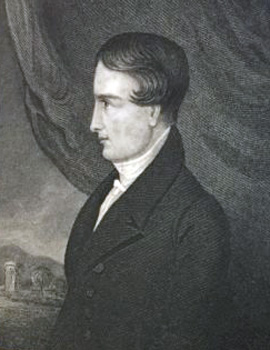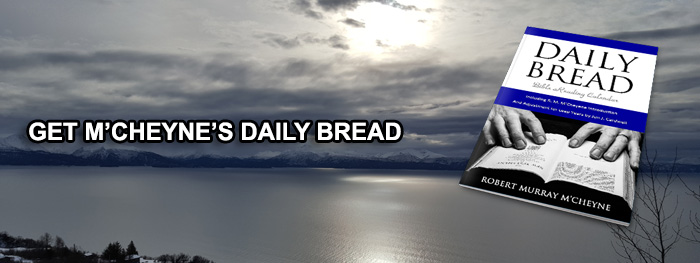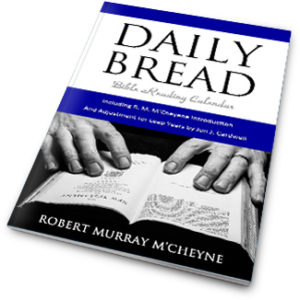Robert Murray M’Cheyne
He assisted John Bonar at the parish of Larbert and Dunipace, near Falkirk in 1835. Robert Murray M’Cheyne served as pastor of St. Peter’s Church in Dundee in 1836. M’Cheyne served there until his death from typhus in 1843. He was only 29 years old.
Robert Murray M’Cheyne, though young, was well-respected as a pastor, preacher and poet. He was known as a man of prayer. Moreover, his depth of reverence for His God and Christ was unmatched by many his senior in ministry. M’Cheyne did more to advance Christ’s kingdom than many have done in several lifetimes.
The “Daily Bread” Bible system is one of the first resources I recommend to Christians.
Below is the “Daily Bread” Calendar Instruction.
Robert Murray M’Cheyne’s “Daily Bread” Instruction
BEING A CALENDAR FOR READING THROUGH THE WORD OF GOD IN A YEAR.
“Thy word is very pure: therefore thy servant loveth it.”
The approach of another year stirs up within me new desires for your salvation, and for the growth of those of you who are saved. “God is my record, how greatly I long after you all in the bowels of Jesus Christ.” What the coming year is to bring forth, who can tell? There is plainly a weight lying on the spirits of all good men, and a looking for some strange work of judgment coming upon this land. There is need now to ask that solemn question: “If in the land of peace, wherein thou trustedst, they wearied thee, then how wilt thou do in the swelling of Jordan?”
Those believers will stand firmest who have no dependence upon self or upon creatures, but upon Jehovah our Righteousness. We must be driven more to our Bibles, and to the mercy seat, if we are to stand in the evil day. Then we shall be able to say, like David, “The proud have had me greatly in derision: yet have I not declined from thy law.” “Princes have persecuted me without a cause: but my heart standeth in awe of thy word.”
It has long been in my mind to prepare a scheme of Scripture reading, in which as many as were made willing by God might agree, so that the whole Bible might be read once by you in the year, and all might be feeding in the same portion of the green pasture at the same time.
I am quite aware that such a plan is accompanied with many…
DANGERS.
(1.) Formality. —We are such weak creatures that any regularly returning duty is apt to degenerate into a lifeless form. The tendency of reading the Word by a fixed rule may, in same minds, be to create this skeleton religion. This is to be the peculiar sin of the last days: “‘Having a form of godliness, but denying the power thereof.”‘ Guard against this. Let the calendar perish rather than this rust eat up your souls.
(2.) Self-righteousness. —Some, when they have devoted their set time to reading the Word, and accomplished their prescribed portion, may be tempted to look at themselves with self-complacency. Many, I am persuaded, are living without any divine work on their soul— unpardoned and unsanctified, and ready to perish— who spend their appointed times in secret and family devotion. This is going to hell with a lie in the right hand.
(3.) Careless reading. —Few tremble at the Word of God. Few, in reading it, hear the voice of Jehovah, which is full of majesty. Some, by having so large a portion, may be tempted to weary of it, as Israel did of the daily manna, saying, “Our soul loatheth this light bread!” and to read it in a slight and careless manner. This would be fearfully provoking to God. Take heed lest that word be true of you: “Ye said also, Behold, what a weariness is it! and ye have snuffed at it, saith the LORD of Hosts.”
(4.) A yoke too heavy to bear. —Some may engage in reading with alacrity for a time, and afterwards feel it a burden, grievous to be borne. They may find conscience dragging them through the appointed task without any relish of the heavenly food. If this be the case with any, throw aside the fetter, and feed at liberty in the sweet garden of God. My desire is not to cast a snare upon you, but to be a helper of your joy.
If there be so many dangers, why propose such a scheme at all? To this I answer, that the best things are accompanied with danger, as the fairest flowers are often gathered in the clefts of some dangerous precipice. Let us weigh…
THE ADVANTAGES.
(1.) The whole Bible will be read through in an orderly manner in the course of a year. —The Old Testament once, the New Testament and Psalms twice. I fear many of you never read the whole Bible; and yet it is all equally divine: “All Scripture is given by inspiration of God, and is profitable for doctrine, for reproof, for correction, for instruction in righteousness: that the man of God may be perfect.” If we pass over some parts of Scripture, we shall be incomplete Christians.
 (2.) Time will not be wasted in choosing what portions to read.— Often believers are at a loss to determine towards which part of the mountains of spices they should bend their steps. Here the question will be solved at once in a very simple manner.
(2.) Time will not be wasted in choosing what portions to read.— Often believers are at a loss to determine towards which part of the mountains of spices they should bend their steps. Here the question will be solved at once in a very simple manner.
(3.) Parents will have a regular subject upon which to examine their children and servants. —It is much to be desired that family worship were made more instructive than it generally is. The mere reading of the chapter is often too like water spilt on the ground. Let it be read by every member of the family beforehand, and then the meaning and application drawn out by simple question and answer. The calendar will be helpful in this. Friends, also, when they meet, will have a subject for profitable conversation in the portions read that day. The meaning of difficult passages may be inquired from the more judicious and ripe Christians, and the fragrance of simpler Scriptures spread abroad.
(4.) The pastor will know in what part of the pasture the flock are feeding. —He will thus be enabled to speak more suitably to them on the Sabbath; and both pastor and elders will be able to drop a word of light and comfort in visiting from house to house, which will be more readily responded to.
(5.) The sweet bond of Christian love and unity will be strengthened. —We shall be often led to think of those dear brothers and sisters in the Lord, here and elsewhere, who agree to join with us in reading these portions. We shall oftener be led to agree on earth, touching something we shall ask of God. We shall pray over the same promises, mourn over the same confessions, praise God in the same songs, and be nourished by the same words of eternal life.
CALENDAR DIRECTIONS.
1. The center column contains the day of the month. The two first columns contain the chapter to be read in the family. The two last columns contain the portions to be read in secret.
2. The head of the family should previously read over the chapter for family worship, and mark two or three of the most prominent verses, upon which he may dwell, asking a few simple questions.
3. Frequently the chapter named in the calendar for family reading might be read more suitably in secret; in which case the head of the family should intimate that it be read in private, and the chapter for secret reading may be used in the family.
4. The metrical version of the Psalms should be read or sung through at least once in the year. It is truly an admirable translation from the Hebrew, and is frequently more correct than the prose version. If three verses be sung at each diet of family worship, the whole Psalms will be sung though in the year.
5. Let the conversation at family meals often turn upon the chapter read and the psalm sung. Thus every meal will be a sacrament, being sanctified by the Word and prayer.
6. Let our secret reading prevent the dawning of the day. Let God’s voice be the first we hear in the morning. Mark two or three of the richest verses, and pray over every line and word of them. Let the marks be neatly done, never so as to abuse a copy of the Bible.
7. In meeting believers on the street or elsewhere, when an easy opportunity offers, recur to the chapters read that morning. This will be a blessed exchange for those idle words which waste the soul and grieve the Holy Spirit of God. In writing letters to those at a distance, make use of the provision that day gathered.
8. Above all, use the Word as a lamp to your feet and a light to your path— your guide in perplexity, your armour in temptation, your food in times of faintness. Hear the constant cry of the great Intercessor,
“SANCTIFY THEM THROUGH THY TRUTH: THY WORD IS TRUTH.”
—Rev. R. M. M’Cheyne
St Peter’s, Dundee, 30th Dec. 1842





Recent Comments